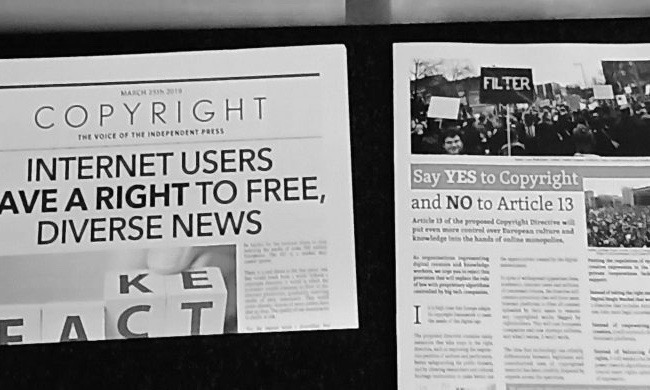Say NO to the harmful Directive!
Today, at 12:30 the European Parliament will say its final word on the faith of the Directive on copyright in the Digital Single Market (you can follow the vote live here).
The Directive as a whole remains harmful, thus, the MEPs should reject it (if you want to know why, watch the video of yesterday’s program Odmevi (in Slovene), on which dr. Maja Bogataj Jančič explained why the Directive should be rejected, or you can read the analysis of the Directive on the website Internet is for the people and our website), especially they should say NO to the harmful Article 13 (now 17). Yesterday, on the eve of the vote on the Directive on copyright in the Digital Single Market, Communia distributed 750 copies of the article “Say YES to copyright and NO to Article 13” to the MEPs. The excerpt of the article can be found below:
“Article 13 of the proposed Copyright Directive will put even more control over European culture and knowledge into the hands of online monopolies. As organisations representing digital creators and knowledge workers, we urge you to reject this provision that will replace the rule of law with proprietary algorithms controlled by big tech companies.
It is high time that Europe adapts its copyright framework to meet the needs of the digital age. The proposed directive contains many measures that take steps in the right direction, such as improving the negotiation position of authors and performers, better safeguarding the public domain, and by allowing researchers and cultural heritage institutions to make better use the opportunities created by the digital environment.
In spite of widespread opposition from academics, internet users and millions of concerned citizens, the directive still contains provisions that will force most internet platforms to filter all content uploaded by their users to remove any copyrighted works flagged by rightsholders. This will cost European companies and new startups millions, and what’s worse, it won’t work. The idea that technology can reliably differentiate between legitimate and unauthorised uses of copyrighted material has been credibly disputed by experts across the spectrum. Putting the regulation of speech and creative expression in the hands of private corporations lacks public support.
Instead of taking the right step toward a Digital Single Market that works for all, a directive that includes Article 13 would sow even more legal uncertainties.
Instead of empowering European creators, it will entrench the position of dominant platforms.
Instead of balancing fundamental rights, it will weaken the law, by shifting power towards algorithms and away from crucial users’ rights upholding freedom of expression.
We support the objective to ensure that creators are rewarded adequately for their creativity. Upload filters themselves will not achieve this objective. This directive needs to take the interests of all stakeholders into account, not only “big tech” and “big content”. Copyright should be a matter of social contract that upholds the public interest, not of secret algorithms controlled by private actors. We therefore ask you to reject the text of the directive as long as it includes Article 13.”
The Grand Board of the European Union Intellectual Property Office (EUIPO) finally ruled that the figurative sign ‘COVIDIOT’ cannot be registered as an EU trademark.
The 4th Open Knowledge Day took place on Tuesday 17 October 2023, with an accompanying workshop on 18 October 2023. This year it was organised by the Open Data and Intellectual Property Institute (ODIPI) and supported by Knowledge Rights 21 (KR21).
We invite you to the fourth Open Knowledge Day and the workshop, which will take place this year within the framework of the programme and with the support of Knowledge Rights 21. The event will bring together experts from different European countries to discuss two topics: the first part will deal with the legal basis for data analytics, which is a key part of machine learning and related artificial intelligence, and the general exception for research. In the second part, open science in theory and practice will be presented both in Slovenia and in some Western Balkan countries. Representatives of research and educational institutions from Slovenia and the Western Balkan countries, as well as interested members of the public, are invited to attend.
Dr. Maja Bogataj Jančič, a renowned expert in copyright law, has joined the Berkman Klein Center for Internet & Society at Harvard University, where she will serve as an affiliate researcher for the next two years.





